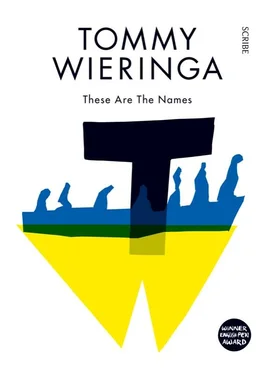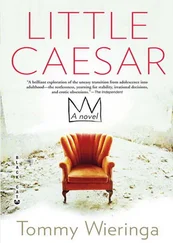She reached around behind and loosened his grip a bit.
‘Sorry,’ Beg said.
‘Close your eyes,’ she said. ‘There’s no one else here.’
He closed his eyes. Behind his lids the lamps slid by in a red blaze.
She had studied mining engineering; in Murmansk she had spent part of her university days in a factory lab where the mineral apatite was converted to superphosphate. The way she spoke those words — Beg had never heard music any lovelier.
Her father was chairman of the regional party council and managing director of a steel mill on the Volga — part of the new nobility, risen after the collapse of the old regime and the redistribution of all resources.
Woe to the lover who believes this enchantment to be his actual, his natural state; what an injustice that it should be denied him so often. How could he have lived without it? Now that the scales have fallen from his eyes, now that he knows the way it really is, he will never let go. From now on, this will be his life. In this blaze, in this daze, he will go on.
The smile on the lover’s lips says that he has plumbed an important secret: he is an initiate; the opiate of love has let him look behind the drab veil of daily life. This is the time of anticipation. The same kitchen smells still waft under his door, children still scream in the hallway, and above his head the neighbour listens to loud martial music, even though he is much too young to be a veteran. But all these things are already different now. Isn’t it true that it annoys him much less than it used to? Don’t the sounds already seem much less loud, and isn’t the stench of roasted meat and herbs from the Tadzhiki refugees next door somehow already less penetrating?
Twenty-eight years later — at another house, in another city — Pontus Beg sits at the table in his living room and stares at his reflection in the darkened window. A happy life, he thinks, is always marked by a certain anticipation, no matter what the Chinese sages may say about emptiness and the absence of expectations. Beneath rustling bamboo beside the rushing stream, it is easier to disengage than it is on the sixth floor, with the heaters gurgling and water rushing through the standpipes, carrying away his neighbours’ bowel movements. Under the table his stockinged feet shuffle on the carpet. His only memories of a certain hunger for life are accompanied by those of expectation and longing — the elation at yet another day. He, too, was capable of that once. No one can imagine it these days; but he, too, sang love songs when he thought no one could hear, and on occasion he jumped for joy on a deserted street.
Things like that happened a long time ago; he can barely imagine it anymore. After being driven out of paradise, he had — gradually, so that he barely noticed it — set up his life as a barrier against pain and discomfort. Suppressing chaos: washing dishes, maintaining order. What did it matter that one day looked so much like the other that he could not recall a single one; he keeps to the middle, equidistant from both bottom and top, although he is sometimes envious of the alcoholics and junkies with their trampoline lives, from low to high, high to low, on and on until they have no more teeth in their mouths and die a lingering, miserable death. He protects the citizenry from them. (He likes the word ‘citizenry’ — it summons up a world in which everything has its place, like the stars in the firmament.) The desperate plunder homes and shops, and rob passers-by at knifepoint in secluded places; they disturb the peace with their ecstasy and despair. He, Pontus Beg, defends the right to an undisturbed life in the middle, for better or for worse. The world is insane, people heartlessly pursue their own interests, and only the middle provides the guarantee of a modicum of peace and quiet.
Does he still have her letters? Of course he still has her letters. Four glasses an evening; he drinks no more than that. He doesn’t want to go stamping around the room on one cold foot and one warm, opening letters, looking at pictures, sighing beneath the false memory of melancholy. The alcoholic born of wistfulness. They’re the worst; Pushkin says so, too.
There had been other women before her. He had fallen in love at times. None of them kept him interested for long. One had stale breath; the other laughed like a hyena. He remembered bitter regret and disappointment in the face of the imperfect. It was such a very fine line.
From one day to the next, therefore, he started keeping his mouth shut. Only the absolutely crucial came out of it.
When he was silent, they talked. Oh, such questions!
What are you thinking about?
Why don’t you say something?
Why are you so quiet?
He saw their disappointed, drawn faces, the uncertainty eating away at them. But he remained silent. It was too painful. Let them draw their own conclusions. Followed by a lingering period of argumentation and feints, then it was over. He was alone at last.
Leah did not have stale breath. She didn’t laugh like a hyena. Nothing about her annoyed him. She was perfection. Eloquent and well raised, but with a certain wildness still, a spontaneity, that drove them to the darkened riverbank to make love. At night they listened to Radio Free Europe. It was illegal and exciting; he knew he was breaking the law, but how could this delectable girl do anything wrong?
Summer arrives. She gives him Eugene Onegin and First Love — he reads literature for the first time.
He is a country boy. His father works for the kolkhoz; in the late afternoon and early evening, they garden on their own land. A quarter of a hectare, they eat from it.
Pontus goes out with a sledgehammer and drives fence posts for all the farmers in the surroundings. His shoulders have become burly; his chest, broad and muscular.
When he walks into his father’s yard, the chicks go running to their mother and disappear, zoof-zoof, beneath her; clucking quietly. The hen ruffles her plumage and settles onto her haunches. She follows him with quick, choppy movements of the head. All those chicks are underneath her now; the young Pontus can imagine no greater sense of security.
In the winter he slaughters the hen, and in the cloaca he finds eggs in various stages of development. The final one is nothing but a yolk. Everything goes into the frying pan; nothing edible is wasted.
Ah, Leah. He nudged his loins up against her buttocks, and she turned her head to him and whispered: ‘Don’t squeeze so hard.’
He relaxed his clasp around her torso, the clutch of a drowning man around a piece of wood. He didn’t understand himself.
‘It doesn’t matter,’ she said when he apologised again, ‘as long as you let go.’
He was alone again with his thoughts, and her breathing grew deep and regular again.
As long as she didn’t think his breath was stale, or that he brayed like a hyena! He tried being silent, to camouflage his lack of refinement. But when they drank, he forgot to be silent, and it was precisely then that he made her laugh so much. She thought he was funny, she said, and he could imagine nothing better than to make this girl laugh.
‘I think humour is an advanced form of intelligence,’ she said.
‘There are humourless people who are very smart,’ he said.
‘My father!’
He doesn’t know her father; she hasn’t introduced him to her parents yet. And she doesn’t seem to be in any hurry to do so.
‘And stupid people with a sense of humour, do they exist?’ she asked.
He thought about most of his colleagues, who seemed to have a lot of fun together at times. He shrugged. A different kind of humour, maybe.
‘A different kind of humour … Yes, I guess that’s possible. But fortunately you’re very funny.’
Читать дальше











